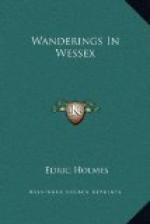The “Walks” are the pleasantest feature of modern Dorchester and run completely round three sides of the town, the fourth being bounded by the “dark waters” of the Frome. They are lined with fine trees planted about two hundred years ago; the West Walk, with its section of Roman Wall, is perhaps the best, though the South Walk with its gnarled old trees is much admired. They all give the town an uncommon aspect, and there is nothing quite like them elsewhere in England. The contrast on turning eastwards from the quiet West Walk into bustling High West Street is striking and bears out the claim that Dorchester still keeps more or less within its ancient bounds, for turning in the other direction we are soon in a different and “suburban” atmosphere. High West Street is lined with pleasant eighteenth century houses, the residences or offices of professional men intermixed with some first-class shops. Once these houses were the mansions of county families who “came to town” for a season when London was for several reasons impracticable. The chief buildings are congregated round the town centre; here is the Perpendicular St. Peter’s church, a building saved during the great fire in 1613 when nearly everything else of antiquity perished. Outside is the statue of William Barnes, the Dorset poet, whose writings in his native dialect are only now gaining a popularity no more than their due. The bronze figure represents the poet in his old fashioned country clergyman’s dress, knee-breeches and buckled shoes, a satchel on his back and a sturdy staff in his hand. Underneath the simple inscription are these quaint and touching lines from one of his poems ("Culver Dell and the Squire"):
“Zoo now I hope his kindly feaece
Is gone to vind a better pleaece;
But still wi’ v’ok a-left
behind
He’ll always be a-kept in mind.”
The speech of the older Dorset folk is the ancient speech of Wessex. It is not an illiterate corruption but a true dialect with its own grammatical rules. But alas! fifty years of the council school and its immediate predecessor has done more to destroy this ancient form of English than ten centuries of intercourse between the Anglo-Celtic races.[2]
[2] A good example of the Dorset dialect is contained in the message sent to the King by the Society of Dorset Men at their annual banquet in London.
“TO HIS MAJESTY KING JARGE
Sire—Dree hunderd loyal men vrom Darset, voregather’d at th’ Connaught Rooms, Kingsway, on this their Yearly Veaest Day, be mindvul o’ yer Grashus Majesty, an’ wi’ vull hearts do zend ee the dootivul an’ loyal affecshuns o’ th’ Society o’ Darset Men in Lon’on. In starm or zunsheen thee ca’st allus rely on our vull-heart’d zympathy an’ suppwort. Zoo wi’out any mwore ham-chammy we ageen raise our cyder cups to ee, wi’ th’ pious pray’r on our lips that Heaven ull prosper ee, an’ we assure ee that Darset Men ull ever sheen as oone o’ th’ bright jools in yer Crown. I d’ bide, az avoretime, an’ vor all time, Thy Vaithful Sarvint,
SHAFTESBURY (President o’ Darset Men in Lon’on).”




